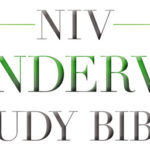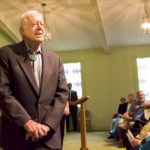RICHMOND, Va.—On a recent Sunday morning at First Baptist Church in Richmond, Va., conversation was lively as members of a Bible study class explored the day's Scripture passage from the Gospel of Luke.
But of the 15 people who responded to comments from the class's facilitator, only about half actually were in the room. The rest were scattered across the country, viewing a live stream on the Internet and offering opinions by e-mail.

David Powers, communications minister at First Baptist Church in Richmond, Va., checks the control panel before live streaming a Bible study class. (PHOTO/Religious Herald)
|
The 3-month-old webcast Sunday school class is the church's first foray into real-time, Internet-based Bible studies, although First Baptist has live streamed its two Sunday morning worship services more than three years.
"We recognize that some people are interested in exploring spiritual matters but will not or cannot come into this or any other church building," said David Powers, the church's associate pastor for communications. "So, a big part of what we're trying to do is provide an opportunity and channel for that. We want to provide an easy-access Bible study opportunity."
The class also offers a "nonthreatening" environment to engage Bible study, said Steve Booth, associate pastor of Christian formation at First Baptist.
"It's a safe place for people to receive and ask honest questions emerging from dialogue around a biblical text," Booth said. "With the guidance of a thoughtful and sensitive facilitator, the student is encouraged to question and reflect theologically on how one moves from awareness of God to belief in Christ to a living faith evidenced in behavior and choices."
On average, Powers said, about 20 people participate in the class via the Internet, while another eight attend in person, joining the facilitator in a studio equipped with cameras, microphones and computers.
"We've had folks from as far away as Tulsa (Okla.) and all around Richmond and in-between," said Mike Harton, a retired Christian educator who is one of the facilitators.
Sign up for our weekly edition and get all our headlines in your inbox on Thursdays
Harton and Phillis Rodgerson Pleasants, a former church history professor who also facilitates the class, craft each week's lesson from lectionary readings on which First Baptist Pastor Jim Somerville preaches the same Sunday. Harton and Rodgerson Pleasants—both members of First Baptist—enhance their teaching with an iPad, whose images are transmitted wirelessly to a wide screen for those in the studio and streamed to the Internet audience.
"What's excited me about this project is that First Baptist is going to where people are rather than only focusing on bringing people into the building," Rodgerson Pleasants said.

Class facilitators Phyllis Rodgerson Pleasants and Mike Harton review class notes before the live webcast begins. (PHOTO/Religious Herald)
|
First Baptist's Internet class is a natural evolution in the church's electronic media experience, Powers said. The congregation began broadcasting its worship services on a local television affiliate in 1986, began posting podcasts and video clips of sermons and music on its website in 2007 and started live streaming worship services in 2008.
About a year ago, Somerville initiated what he called "microchurch," encouraging people to form faith communities in homes and apartments using the televised and webcast worship services, as well as other resources posted on First Baptist's website.
"The Web class fits in well with the idea of microchurch," Harton said.
But despite extensive media experience, Powers acknowledged there's been a big learning curve for him and his crew of trained volunteers, all members of First Baptist.
"Part of the challenge is that we can't find anyone else who's doing this kind of thing, so we don't have anybody's technology or pedagogy to pattern," he said. "We've been working at it for three months and still have a long way to go. All of this is new—not only for the volunteers but also for us paid staff and for all the outside experts and vendors we've talked with.
"We're all trying to figure it out as we go along—and not only on the tech side but also the content side. We want to teach and lead in such a way that Web participants are engaged and actually learn something."
The next step—live audio/video interaction capability for Web participants, Powers said.
"It would work like a video chat or a Web-conference," he said. "We still have some technical issues to resolve, but we believe we can do it."














We seek to connect God’s story and God’s people around the world. To learn more about God’s story, click here.
Send comments and feedback to Eric Black, our editor. For comments to be published, please specify “letter to the editor.” Maximum length for publication is 300 words.